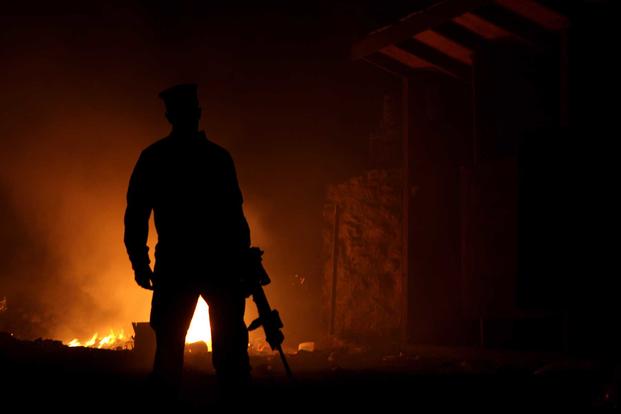A new study has found that exposure to military burn pits increases the risk of mental health conditions and brain injuries, a finding researchers say could lead to better understanding of those conditions in veterans.
The study, conducted by various universities, including the Brown School of Public Health and the Harvard Injury Control Research Center, and Department of Veterans Affairs epidemiologists, examined the medical records and deployment data of nearly 440,000 Army and Air Force members who deployed from 2001 to 2011.
The researchers found that service members who deployed to bases with large burn pits had higher rates of anxiety and post-traumatic stress disorder, but also higher rates of brain damage and injury-related deaths.
Read Next: The Marines Are Leaving Los Angeles
According to the data, nearly 29% of service members diagnosed with severe stress had spent at least 130 days at a base with a burn pit, compared with roughly 13% who were diagnosed but served at a base that didn’t burn its trash.
Personnel were twice as likely to be diagnosed with anxiety if they spent at least four months at a base with a burn pit than those who served at cleaner installations.
And of the 979 troops in the study who died by suicide using a firearm, 90% had served on a base with a large burn pit for 129 days or more.
The researchers theorize that the hazardous materials released by the burn pits, which were used to dispose of garbage, medical waste, plastics, batteries, office equipment, tires, ammunition and other items, can disrupt endocrine and immune function, accumulate in the brain or disrupt neurotransmitters and contribute to brain inflammation.
“We have, essentially, this cocktail of various hazardous exposures, which include a lot of known carcinogens. We know they could really impact areas of the brain that are really strongly associated with mental health,” Christian Hoover, a National Institutes of Health research fellow at Brown University, said in an interview with Military.com.
The research points to an association between burn pits and mental health conditions but does not show that burn pits caused the disorders. But the study still indicates a link between cumulative exposure and mental health conditions.
“The genesis of the project was essentially the idea that environmental exposures could influence mental health,” Hoover said.
Previous research had shown an association between burn pit exposure and injury and suicide.
Another study, released in 2024, also found that veterans who served at bases with burn pits were more likely to have heart disease, high blood pressure and chronic respiratory illnesses than those who weren’t exposed to the pollution.
To address illnesses linked to burn pit exposure during Operations Enduring Freedom and Iraqi Freedom, Congress passed the PACT Act, providing health care and benefits to millions of veterans exposed to environmental contamination in Iraq, Afghanistan and elsewhere.
Diseases considered by the VA to be eligible for expedited disability benefits and medical services under the PACT Act include respiratory conditions and certain types of cancer.
Mental health conditions are not considered to be “presumptive” to military service, and some conditions, like post-traumatic stress disorder, must be linked to certain events in military service.
Hoover said the study has limitations because it does not include additional factors that can affect mental health, such as combat or blast exposure, and it also did not include information on health care provided outside the VA.
It also did not take into account the timing of diagnoses in relation to the burn pit exposure. But given its large size, the findings “heighten concerns about the potential of long-term health impact of exposure to burn pits,” the authors noted.
Hoover said the study could provide comfort to those exposed to burn pits who have been diagnosed with a mental health condition. While American society has made a concerted effort in the past decade to reduce the stigma of mental health diagnoses, some veterans continue to misunderstand the nature of those conditions, he said.
“It feels a little bit easier to understand these conditions when you think of it as being linked to an exposure, rather than something that is reflected about your personality or your sense of self,” Hoover said. “It provides the understanding that burn pits affect not just the lungs and heart, but also brains and behavior.”
The study was published by the Journal of Occupational and Environmental Medicine.
Related: VA Plans Outreach to Screen 3 Million More Veterans for Toxic Exposures
Story Continues
Read the full article here





